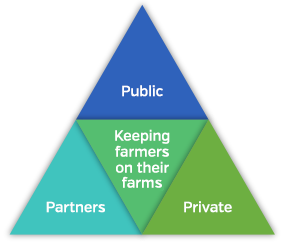|

Public-Private Partnerships
The public sector’s strengths benefit the crop insurance program in many ways. As a regulator, we ensure the fairness of policies and set the rules. We also make sure that policy rates are accurate and just — and that there’s crop insurance options for all producers, large and small.
Working with the private sector, RMA provides innovative crop insurance products for today’s crops. Expanding coverage helps keep farmers and ranchers on their land by strengthening the farm safety net.
Private-sector insurance companies sell and service the policies. RMA approves crop insurance premium rates, administers premium and expense subsidies, approves and supports products, and reinsures the insurance companies.
The U.S. Department of Agriculture's Risk Management Agency (RMA) works with private partners to assist producers, especially limited resource, socially disadvantaged and other traditionally under-served farmers and ranchers, in effectively managing long-term risks and challenges. Over the past 10 years, RMA has awarded $124 million for such partnership agreements involving risk management education and training programs.
Through these partnerships, producers will receive assistance in understanding and using crop insurance programs and other tools so they can make the best risk management decisions for their agricultural operations. Past award recipients have included universities, county cooperative extension offices and non-profit organizations.
Private development of crop insurance policies allows RMA to keep pace with evolving risks and safety net requirements within agricultural production. The amounts of crop insurance coverage and payments for insured loses to producers have gone up nearly to $102.1 billion and $5.6 billion in the 2015 crop year, respectively. The FCIC Board includes six members from the private sector. The Board is represented by four farmers (one of whom grows specialty crops), an insurance professional (often an agent); and an individual who’s knowledgeable about reinsurance or regulation.
We partner with Approved Insurance Providers (AIP) to improve both delivery and development of crop insurance policies for farmers and ranchers. By partnering with AIPs, RMA enhances statewide coverage options across an increasingly diverse portfolio of crops.
The Standard Reinsurance Agreement (SRA) and the Livestock Price Reinsurance Agreement are cooperative financial assistance agreements between the Federal Crop Insurance Corporation (FCIC) and an insurance company. FCIC is a government corporation within USDA authorized to carry out programs of the Federal Crop Insurance Act. The Risk Management Agency acts on behalf of FCIC to administer all Federal crop insurance programs.
There are two types of AIPs based on their underlying reinsurance agreements with the USDA Risk Management Agency. The first group of AIPs, referred to as Crop Insurance Providers, are designated to provide crop insurance coverage through the Standard Reinsurance Agreement for the year 2016. The second group of AIPs, referred to as Livestock Price Insurance Providers, are designated through the Livestock Price Reinsurance Agreement to provide insurance coverage through the for the year 2016.
Contact Information
Find a crop insurance agent to discuss available options.
Crop insurance is sold and delivered solely through private crop insurance agents. A list of crop insurance agents is available at all USDA Service Centers and online at the RMA Agent Locator.
For more information, contact RMA Public Affairs.
|